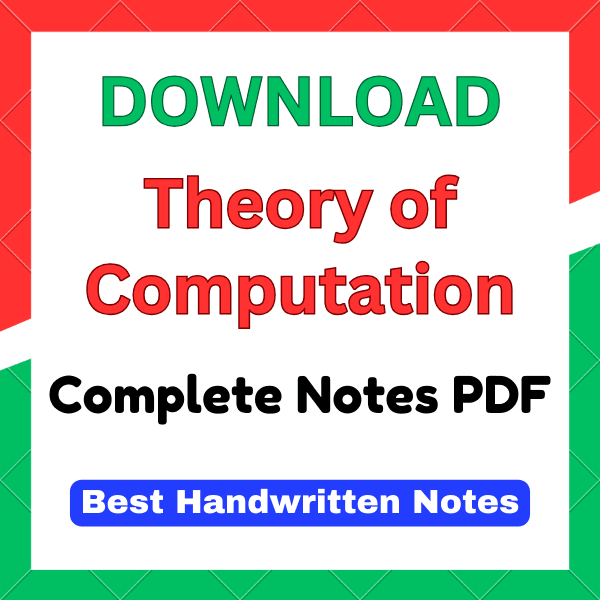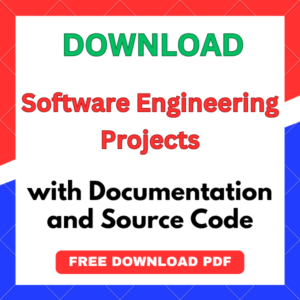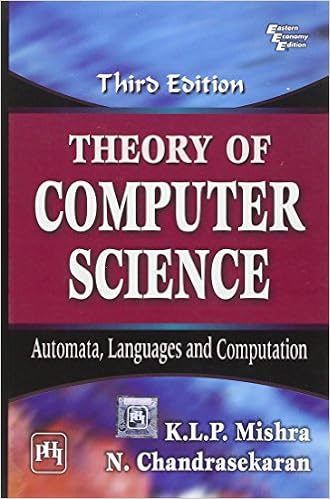Theory of Computation Notes PDF
Free Theory of Computation notes pdf are provided here for Theory of Computation students so that they can prepare and score high marks in their Theory of Computation exam.
In these free Theory of Computation notes pdf, we will study the formal models of computation, namely, finite automaton, pushdown automaton, and Turing machine; and their relationships with formal languages. Students will also learn about the limitations of computing machines.
We have provided complete Theory of Computation handwritten notes pdf for any university student of BCA, MCA, B.Sc, B.Tech CSE, M.Tech branch to enhance more knowledge about the subject and to score better marks in their Theory of Computation exam.
Free Theory of Computation notes pdf are very useful for Theory of Computation students in enhancing their preparation and improving their chances of success in Theory of Computation exam.
These free Theory of Computation pdf notes will help students tremendously in their preparation for Theory of Computation exam. Please help your friends in scoring good marks by sharing these free Theory of Computation handwritten notes pdf from below links:
Topics in our Theory of Computation Notes PDF
The topics we will cover in these Theory of Computation Notes PDF will be taken from the following list:
Introduction to Automata: The Methods Introduction to Finite Automata, Structural Representations, Automata, and Complexity. Proving Equivalences about Sets, The Contrapositive, Proof by Contradiction, Inductive Proofs: General Concepts of Automata Theory: Alphabets Strings, Languages, Applications of Automata Theory.
Finite Automata: The Ground Rules, The Protocol, Deterministic Finite Automata: Definition of a Deterministic Finite Automata, How a DFA Processes Strings, Simpler Notations for DFA’s, Extending the Transition Function to Strings, The Language of a DFA Nondeterministic Finite Automata: An Informal View. The Extended Transition Function, The Languages of an NFA, Equivalence of Deterministic and Nondeterministic Finite Automata. Finite Automata With Epsilon-Transitions: Uses of ∈-Transitions, The Formal Notation for an ∈-NFA, Epsilon-Closures, Extended Transitions, and Languages for ∈-NFA’s, Eliminating ∈- Transitions.
Regular Expressions and Languages: Regular Expressions: The Operators of regular Expressions, Building Regular Expressions, Precedence of Regular-Expression Operators, Precedence of Regular-Expression Operators Finite Automata and Regular Expressions: From DFA’s to Regular Expressions, Converting DFA’s to Regular Expressions, Converting DFA’s to Regular Expressions by Eliminating States, Converting Regular Expressions to Automata.
Properties of Regular Languages: The Pumping Lemma for Regular Languages, Applications of the Pumping Lemma Closure Properties of Regular Languages, Decision Properties of Regular Languages, Equivalence and Minimization of Automata,
Context-Free Grammars and Languages: Definition of Context-Free Grammars, Derivations Using a Grammar’s Leftmost and Rightmost Derivations, The Languages of a Grammar.
Parse Trees: Constructing Parse Trees, The Yield of a Parse Tree, Inference Derivations, and Parse Trees, From Inferences to Trees, From Trees to Derivations, From Derivation to Recursive Inferences,
Applications of Context-Free Grammars: Parsers, Ambiguity in Grammars and Languages: Ambiguous Grammars, Removing Ambiguity From Grammars, Leftmost Derivations as a Way to Express Ambiguity, Inherent Ambiguity
Pushdown Automata: Definition Formal Definition of Pushdown Automata, A Graphical Notation for PDA’s, Instantaneous Descriptions of a PDA,
Languages of PDA: Acceptance by Final State, Acceptance by Empty Stack, From Empty Stack to Final State, From Final State to Empty Stack. Equivalence of PDA’s and CFG’s: From Grammars to Pushdown Automata, From PDA’s to Grammars
Deterministic Pushdown Automata: Definition of a Deterministic PDA, Regular Languages and Deterministic PDA’s, DPDA’s and Context-Free Languages, DPDA’s and Ambiguous Grammars
Properties of Context-Free Languages: Normal Forms for Context-Free Grammars, The Pumping Lemma for Context-Free Languages, Closure Properties of Context-Free Languages, Decision Properties of CFL’s
Introduction to Turing Machines: The Turing Machine: The Instantaneous Descriptions for Turing Machines, Transition Diagrams for Turing Machines, The Language of a Turing Machine, Turing Machines and Halting Programming Techniques for Turing Machines, Extensions to the Basic Turing Machine, Restricted Turing Machines, Turing Machines, and Computers,
Undecidability: A Language That is Not Recursively Enumerable, Enumerating the Binary Strings, Codes for Turing Machines, The Diagonalization Language An Undecidable Problem That Is RE: Recursive Languages, Complements of Recursive and RE languages, The Universal Languages, Undecidability of the Universal Language Undecidable Problems About Turing Machines: Reductions, Turing Machines That Accept the Empty Language. Post’s Correspondence Problem: Definition of Post’s Correspondence Problem, The “Modified” PCP, Other Undecidable Problems: Undecidability of Ambiguity for CFG’s.
Theory of Computation Notes PDF FREE Download
Theory of Computation students can easily make use of all these complete Theory of Computation notes pdf by downloading them from below links:

Theory of Computation Handwritten Notes by Abhishek.pdf

Theory of Computation Handwritten Notes by Deepali.pdf

Theory of Computation Handwritten Notes by Manoj.pdf

Theory of Computation Handwritten Notes by Abhishek Sharma.pdf

Theory of Computation Handwritten Notes by Riya.pdf

Theory of Computation Handwritten Notes by Shakshi.pdf

Theory of Computation Notes.pdf

Theory of Computation Notes 2.pdf
How to Download FREE Theory of Computation Notes PDF?
Theory of Computation students can easily download free Theory of Computation notes pdf by following the below steps:
- Visit TutorialsDuniya.com to download free Theory of Computation notes pdf
- Select ‘College Notes’ and then select ‘Computer Science Course’
- Select ‘Theory of Computation Notes’
- Now, you can easily view or download free Theory of Computation handwritten notes pdf
Theory of Computation Books
We have listed the best Theory of Computation Books that can help in your Theory of Computation exam preparation:
Benefits of FREE Theory of Computation Notes PDF
Free Theory of Computation notes pdf provide learners with a flexible and efficient way to study and reference Theory of Computation concepts. Benefits of these complete free Theory of Computation pdf notes are given below:
- Accessibility: These free Theory of Computation handwritten notes pdf files can be easily accessed on various devices that makes it convenient for students to study Theory of Computation wherever they are.
- Printable: These Theory of Computation free notes pdf can be printed that allows learners to have physical copies of their Theory of Computation notes for their reference and offline reading.
- Structured content: These free Theory of Computation notes pdf are well-organized with headings, bullet points and formatting that make complex topics easier to follow and understand.
- Self-Paced Learning: Free Theory of Computation handwritten notes pdf offers many advantages for both beginners and experienced students that make it a valuable resource for self-paced learning and reference.
- Visual Elements: These free Theory of Computation pdf notes include diagrams, charts and illustrations to help students visualize complex concepts in an easier way.
We hope our free Theory of Computation notes pdf has helped you and please share these Theory of Computation handwritten notes free pdf with your friends as well
Download FREE Study Material App for school and college students for FREE high-quality educational resources such as notes, books, tutorials, projects and question papers.
If you have any questions feel free to reach us at tutorialsduniya@gmail.com and we will get back to you at the earliest.
TutorialsDuniya.com wishes you Happy Learning!
Computer Science Notes
Theory of Computation Notes FAQs
Q: Where can I get complete Theory of Computation Notes pdf FREE Download?
A: TutorialsDuniya.com have provided complete Theory of Computation free Notes pdf so that students can easily download and score good marks in your Theory of Computation exam.
Q: How to download Theory of Computation notes pdf?
A: Theory of Computation students can easily make use of all these complete free Theory of Computation pdf notes by downloading them from TutorialsDuniya.com
Software Engineering Projects with Documentation & Source

You will always find the updated list of top and best free software engineering projects with documentation and source code pdf in an easy and quick way. Our Free software engineering projects with source code list has projects for beginners, intermediates as well as experts to learn in 2023.
URL: https://tutorialsduniya.com/software-engineering-projects-pdf/
Author: Delhi University
5


















